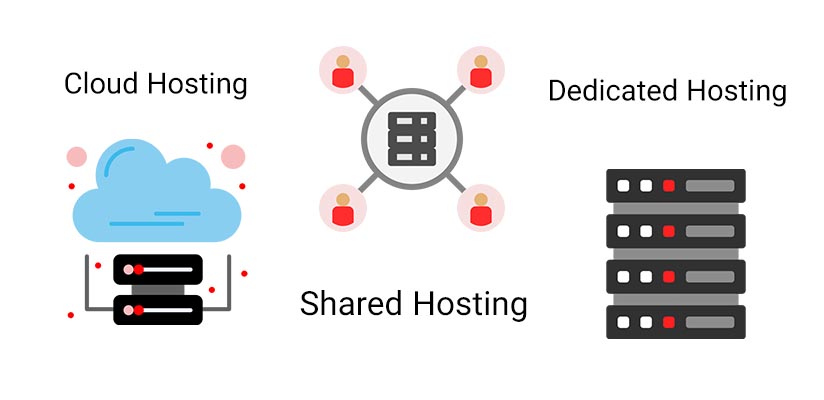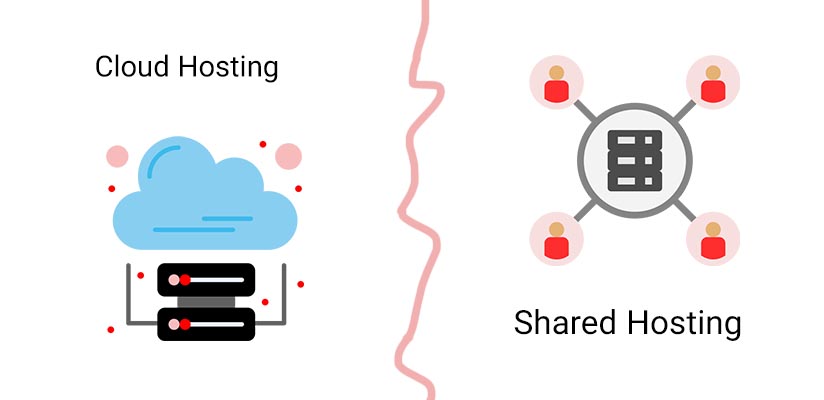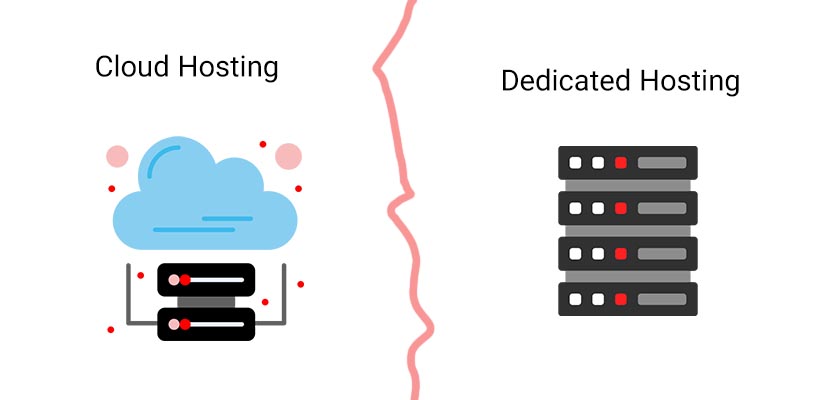
When you are ready to launch a website, selecting the right web host is a difficult decision. It’s not an easy task, even for experienced developers, given the number of web hosting companies that offer various types of services and features.
Before you choose a web host, make sure to determine what type of hosting you require.
In this article, we would like to discuss different types of web hosting such as Cloud, shared, and dedicated hosting and in the end offer the best cloud hosting service that you can find on the internet that is SEO friendly as well as fast and reliable.
What Is Shared Hosting?
For those who are building their first website, shared hosting is the best option.
If you sign up for shared hosting, your website will be placed on the same server as hundreds or even thousands of other websites. Each customer must share the resources and CPU time on the server with all other customers, RAM, and disk space.
Imagine living in a shared host apartment. All residents of the building share common amenities like elevators, stairwells, parking, and garbage collection.
Pros
- It is cheap. Hosting companies can charge as low as $3.95 per month.
- It’s beginner-friendly. It is much easier to get started with shared hosting than other web hosting options.
- Security server upgrades and maintenance are handled by the provider.
Cons
- It can slow down. Your page load times could be affected by the many websites that are running on the same server.
- Security cannot be guaranteed. Your site may be at risk if another site uses the same server.
- Performance and server control issues can lead to poor performance. Performance can be affected by server overload or when another website uses more resources than the server has to offer.
- Because of limited storage and bandwidth, scaling is difficult.
Shared Hosting Is Best Suited for:
Blogs and personal websites are small websites that receive little traffic.
What Is Dedicated Hosting?
It sounds exactly as it does: A dedicated server stores your website on one physical server that is exclusively for your personal use. The server is yours alone, you don’t have to share it with anyone and you can set up the hosting environment to your specifications.
Although hosting can be more expensive than other types of hosting, it offers a much higher level of performance as well as greater security. It’s also the best choice to optimize the Largest Contentful Painting performance and one of the core Web Vitals metrics.
You can think of dedicated hosting as owning your house. If you don’t have a family member, you are the only one living there. You are free to park your car on your driveway and paint your home any color you want. You are ultimately responsible for maintaining your home and installing a security alarm to deter burglars.
Pros
- You can have your own dedicated server.
- You can modify the server’s settings to meet your needs.
- It’s fast. You have 100% access to server resources.
- Server performance is excellent because you can customize the server to your site’s needs.
- It’s secure. You don’t need to worry about sharing hosting because you are the only one using it.
- 24/7 support. Web hosting companies will give you the best support possible because you are paying a lot for your account.
Cons
- It is expensive.
- To optimize and maintain the server, you will need technical personnel. Your server is your responsibility. If something goes wrong, it’s your responsibility to fix it.
Price
Prices for dedicated hosting range from $80 to $500 per month, depending on what you need. Prices are usually determined by server specifications and other services.
Dedicated Hosting Is Best Suited for:
Because dedicated hosting can be quite expensive, it is best for large companies or websites with high traffic that have over 500,000 monthly visitors and who have the technical staff necessary to maintain the server. If you are a business that needs high levels of security, dedicated hosting may be a good option.
What Is Cloud Hosting?
Cloud hosting is based upon cloud computing technology that allows unlimited numbers of machines to work together as one system. Instead of hosting a website on one server, it is hosted on a virtual part of that server which draws its resources from a network. This allows multiple servers to be used together to handle spikes or high traffic for a website.
Cloud hosting is highly reliable as it draws its resources from multiple servers. If one server goes down the other servers will fill in the gap. Cloud hosting is flexible and scalable so that it can grow with your site. You can add more resources to your cloud hosting account.
Cloud hosting is like renting a room on Airbnb. The owner and guests share the house. If there aren’t any guests, you can move on to another Airbnb home.
Pros
- It’s reliable. Cloud hosting is different from other hosting services that depend on physical hardware. It takes place in data centers that are made up of hundreds of servers and have multiple redundancies to protect against any failures.
- Flexibility and scalability. Cloud hosting is flexible and can scale up to meet your requirements.
- Cost-efficient. Only pay for what you use
Cons
- You will need to have advanced knowledge. Cloud hosting is not an easy solution for developers.
- Insecure. Or is it? You are sharing resources with other websites. This point can be argued.
Price
Dedicated hosting costs typically $30 to $50, but prices are usually per-use.
Cloud Hosting Is Best suited for:
Cloud hosting is an excellent option for any business, especially considering its affordability. You might consider other hosting options if you don’t have the technical knowledge or access to someone who does.
Cloud Hosting vs Shared Hosting

Shared hosting allows multiple websites to share the same server and resources. This is great for projects that have low traffic and don’t require many resources.
Hosting space is very limited for individual websites. One server can usually host many websites. Shared hosting is the most cost-effective option. However, you only rent a small portion of the server space. This means that your performance and security are limited.
Shared hosting solutions are not scalable if you have a growing website.
Cloud hosting servers on the other hand offer a secure and scalable solution to your website(s), and complete freedom in the selection of resources (RAM/processor, bandwidth, and storage) for your WordPress site(s).
Cloud hosting is a great choice for businesses that have medium to high traffic volumes, especially in the holiday season. Cloud hosting is able to handle unexpected traffic spikes due to viral content or the popularity of a hot product. Your website will still perform well despite these unexpected spikes.
Performance
In a shared hosting environment, performance can take a serious hit. Your site could crash if any website on the server uses all the bandwidth. Performance can be affected by how many websites are on the server and how much each website uses. The performance of a website can vary greatly and depend on many factors.
Cloud hosting allows you to always see what resources are available and you can scale your server according to your needs and budget.
Security
Shared hosting can be vulnerable because hackers could gain access to all the websites. If you host a website using shared hosting, it is important to be very careful about your security and to ensure that you are always monitoring your security.
Cloud hosting makes security less of an issue. Although no website is perfect, cloud hosting offers a level of security that shared hosting can’t offer.
Price
Although prices for cloud and shared hosting vary depending on web hosts, bandwidth, memory, and other options, it is possible to find average prices. Shared hosting prices range from $5 up to $15 per month. However, some web hosts offer more resources and can charge 50 per month.
Cloud hosting is more expensive than traditional hosting. There are also different payment options depending on the provider. A good cloud hosting service will cost you between $10 and $200 per month. However, website owners who require fewer resources can find cheaper options that are more affordable.
Cloud Hosting vs Dedicated Hosting

First, dedicated hosting can be prone to underperformance during traffic spikes. The resources are fixed and cannot scale up with traffic growth. Visitors begin to notice a drastic change in their user experience once the resource consumption reaches the maximum limit.
While dedicated hosting is considered a better option than shared hosting in many cases, it is not the best choice for websites with high traffic that require a more user-friendly experience. Experts recommend that dedicated hosting sites look into cloud-based hosting options in many cases.
Cloud hosting is useful in situations such as sudden traffic spikes or when the website’s resources are required more frequently. Cloud hosting adapts to your website’s growth and provides the resources necessary to provide quality service without interruptions while protecting the data.
Cloud servers are not restricted by the physical resources of one server (dedicated server) or the proximity to neighboring servers (shared hosting). Cloud hosting also allows you to quickly adapt resources without having to interrupt the service.
Performance
Cloud hosting allows customers to enjoy the best of both hosting types. Cloud hosting allows customers to easily adjust resources as required, making it more flexible and thus more attractive financially. It is possible to increase servers’ capacity automatically to meet higher demand without having to purchase it permanently. It works like a heating bill. You only use what you actually need and you pay for the rest after you’re done.
Cloud servers can be run on a hypervisor, which is different from dedicated servers. A hypervisor’s role is to manage the available capacity and allocate it according to the operating systems. Cloud hosting allows you to have many cloud servers for every client. It is possible to allocate computing resources to specific customers if and when needed. Websites can access more resources if they experience high traffic. Cloud servers offer greater redundancy. The other servers can replace a failed server if it fails.
Security
Because it relies on the knowledge of users or sysadmins, dedicated hosting servers are more vulnerable than other types of hosting. A user must monitor server security and make backups frequently. Cloud hosting is the opposite. The hosting provider handles all security aspects so that the user can focus on the content of his website.
Fault Protection
Dedicated hosting is an advanced type of hosting where the customer owns all physical servers. The server is completely dedicated to the customer, and not shared with any other clients. Sometimes, the client may even be able to use multiple servers that are dedicated solely to him.
Although dedicated servers offer full control over hosting, the downside is that they require planning in advance. You need enough resources and processing power for the traffic expected. These levels can be underestimated, which could lead to insufficient resources for busy periods. However, overestimating them could result in paying more for less capacity. They are disadvantageous because they require planning and sufficient processing power.
Price
Customers who wish to own their own server websites will benefit more from a dedicated server. This type of server allows the user to manage and administrate their server as they please. Although the prices may be higher, this type of hosting is highly recommended for those who require high transfer quality and responsive customer support. The price of a dedicated server varies depending on its performance. It can cost between $50 and $1000 per month, which is more expensive than cloud hosting or shared hosting.
Conclusion
In this article, we talked about the best cloud hosting scenarios and what you can expect if you buy cloud hosting server. It’s crucial to determine what kind of hosting you require before choosing a web hosting provider.
This article should have given you an overview of all the options. Next, you will need to choose a web hosting provider. There are many other factors, including price, reputation, features, and scalability.
It’s a smart idea to start small with a trusted shared hosting plan if you are just starting your website. As your site grows, you can upgrade to cloud, dedicated, or VPS hosting.
Leave a Reply